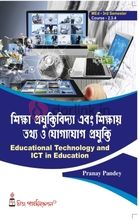×
Siksha Prajuktibidya ebong Sikshay Tathyo O Jogajog Prajukti [M.Ed 1st Sem- Education]
Writer : Pranay Pandey
- Shipping Time : 4 Days
- Policy : Return/Cancellation?
You can return physically damaged products or wrong items delivered within 24 hours with photo/video proof.
Contact Customer Support for return initiation and receive return authorization via email. Securely package for return.
Refunds for eligible returns are processed within 7-10 business days via Bank Transfer.
Order cancellation allowed within 24 hours of placing it. Standard policy not applicable for undamaged/wrong product cases. Detailed info. - Genre : Educational>D.El.Ed/B.Ed./M.Ed.
- Publication Year : NA
- ISBN No : NA
- Binding : No Binding Available
- Pages : NA
- Weight : NA
- Height x Width x Depth : 8.5x5.5x0.5 Inch
MRP : ₹200.00/-
Discount : 10% Off
Your Price : ₹180.00/-
MRP is subject to change as per edition/impression by the publisher.If so, it will be notified
About the Book
Educational Technology
Unit I: Concept of Educational Technology
- Meaning and Nature of Educational Technology
- Meaning and Nature of Instructional technology
- Information and Communication Technology
- Emergence of Educational Technology as a discipline
- Definitions, Scope, Functions and Objectives of Educational Technology
- Approaches to Educational Technology:
- Media Approach
- Audio-Visual Approach – Development of Communication Theory, Communication Models, Mass Communication, Convergence of Communication and Educational Technology
- Cybernetics (System Approach) –– Origin of system concept, characteristics and stages of instructional system, general and instructional system theory
Unit II: Concept of Instructional Design
- Meaning and Need of Instructional Design
- Implications of learning theories for Instructional design
- Behavioural Learning Theories
- Social Learning Theories
- Cognitive and constructivist Learning Theories
- Theory of multiple intelligences and its implications for instructional design
- Developing a personal learning theory
- Types of Learning and learning styles. Instructional Design Models
- ADDIE Model
- System Model
- ASSURE Model
- ARCS Model
ICT in Education
Unit I: Digital Technology & Socio-Economic Context
- Concept of ICT
- Technological Determinism & Developmental Challenges
- Technology Integrated Education: Management Information System Series
- Media Crowd & Media Culture
- High Tech & High Touch
Unit II: Information Age Skills
- Info-Savvy Skills: Asking, Accessing, Analyzing, Applying & Assessing
- Techno-Pedagogic Skills
- Media-Message Compatibility
- Media Designing
- Integration of message, media and modes
- Proximity of Message Forms
- Media Language Proficiency
- Media Choice
- Media Credibility
- Message Authenticity
- Digital Skills: Functional Literacy skills, Scientific Literacy skills, Technological Literacy skills, Functional Literacy, Information Literacy skills, Cultural Literacy skills, Global Awareness skills
Unit III: ICT Integrated Education
- On line Admissions
- Digital Lesson Designing
- Evaluation Rubrics
- E-Portfolios of Learners
- Time-Space-Personnel Management
- Learning Resources Management
- Web Based Instruction
- Office Automation
- Online Research
- E-guidance & Counselling
- E-modules
- E-learning Resources
Unit IV: ICT supported Teaching-Learning Strategies
- E-Learning and Web base learning—concept, features and educational application
- Co-operative and Collaborative Learning—concept, features and educational application
- Project based Learning—concept, features and educational application
- Communication Tools—Mobile, e-mail, chat Online Conferencing, Blog, Wiki, Internet forum, News Groups
- Unit V: New trends in ICT l Virtual Classroom—Concept, Elements, Advantages and Limitations
- Smart Classroom—Concept, Elements, Advantages and Limitations
- Edusat—Concept, Elements, Advantages and Limitations
- Online Learning Resources: e-Library, Websites, Apps, and Web 2.Technology Social networking as an effective communication tool

